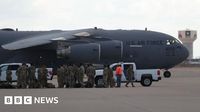In a dramatic turn of events over the weekend, a U.S. federal judge temporarily halted the Trump administration’s attempt to deport hundreds of unaccompanied Guatemalan children, many of whom were already on planes and minutes from being flown out of the country. The decision, handed down in the early hours of August 31, 2025, by District Judge Sparkle Sooknanan, capped a whirlwind legal battle that unfolded as immigration advocacy groups raced to court to prevent the removals.
The case began to unfold late Saturday night, when shelters housing unaccompanied minors received urgent instructions from the Office of Refugee Resettlement (ORR) to prepare the children for deportation within two hours. According to TIME, the ORR’s memo directed shelters to have two sack lunches and one suitcase ready for each child. The directive sent shockwaves through the advocacy community, as many of the children—some as young as 10—had pending immigration cases and were supposed to be protected by U.S. law.
By 1 a.m. on Sunday, the National Immigration Law Center (NILC) filed an emergency lawsuit on behalf of approximately 600 Guatemalan children in government custody. The children, aged between 10 and 17, were in the midst of active court proceedings and, according to the lawsuit, their sudden removal would violate the Trafficking Victims Protection Reauthorization Act of 2008, the Immigration and Nationality Act, and constitutional protections. The NILC argued, “All unaccompanied children — regardless of the circumstances of their arrival to the United States — receive the benefit of full immigration proceedings, including a hearing on claims for relief before an immigration judge.”
Judge Sooknanan, who was awakened at 2:35 a.m. to hear the case, wasted no time. At 4 a.m., she issued a temporary restraining order, blocking deportations for 14 days and instructing that “the government cannot remove any children” while the case proceeds. She made it clear that her order applied to all Guatemalan minors who had arrived in the U.S. without parents or guardians, not just the original group of ten children cited in the emergency motion, as reported by Reuters.
The situation on the ground was tense and chaotic. Some children had already been loaded onto planes on the tarmac in Harlingen and El Paso, Texas—airports often used for deportation flights. One government lawyer, Drew Ensign, told the court that one plane may have taken off but had returned after the order was issued. “We’re here to try to figure out as quickly as we can what is happening,” Judge Sooknanan remarked during the hastily convened Sunday afternoon hearing.
Meanwhile, the Trump administration maintained that the operation was a matter of family reunification, not deportation. Justice Department attorney Drew Ensign insisted that the flights were meant to return children to their parents or relatives in Guatemala, citing requests from both the Guatemalan government and the children’s families. “It is outrageous that the plaintiffs are trying to interfere with these reunifications,” Ensign said, according to TIME.
This assertion was hotly contested by immigration advocates. Efrén C. Olivares, vice president of litigation and legal strategy at the NILC, stated, “In the dead of night on a holiday weekend, the Trump administration ripped vulnerable, frightened children from their beds and attempted to return them to danger in Guatemala.” He continued, “We are heartened the Court prevented this injustice from occurring before hundreds of children suffered irreparable harm. We are determined to continue fighting to protect the interest of our plaintiffs and all class members until the effort is enjoined permanently.”
Advocacy groups pointed out that many of the children did not want to return and had credible fears of abuse, persecution, or even torture if sent back to Guatemala. One plaintiff was a 10-year-old indigenous girl whose mother had died and who had suffered abuse and neglect from other caretakers, according to Reuters. The lawsuit emphasized that the children, housed in shelters or foster care across California, Texas, Pennsylvania, and New York, faced “clear violation of the unambiguous protections that Congress has provided them as vulnerable children.”
The Trump administration’s move was part of a broader crackdown on undocumented migration, a key campaign promise that has defined President Trump’s second term. In June, the U.S. Supreme Court cleared the way for the administration to resume deportations of migrants to countries other than their homeland, without allowing them to raise concerns about the dangers they might face upon return, BBC reported.
The agreement between the U.S. and Guatemala to repatriate unaccompanied children had been in the works for months. In July, Guatemalan President Bernardo Arevalo confirmed his government was cooperating with the U.S. on these returns, though Guatemala’s foreign ministry declined to comment on the specifics of the weekend’s events. The ORR, which operates under the Department of Health and Human Services, sent memos to attorneys representing the children, stating that the removals were at the request of the Guatemalan government “for the purposes of reunifying the UAC with suitable family members.”
Not everyone saw the judge’s intervention as a victory. White House Deputy Chief of Staff Stephen Miller, a key architect of Trump’s immigration agenda, took to X (formerly Twitter) to criticize the decision: “The minors have all self-reported that their parents are back home in Guatemala. But a Democrat judge is refusing to let them reunify with their parents.”
Still, the court’s order brought immediate relief to the children and their advocates. According to Associated Press, buses carrying children were seen pulling away from planes, and government lawyers confirmed the children were being returned to ORR custody pending further legal proceedings. The Department of Homeland Security and the Department of Health and Human Services did not respond to requests for comment, and Guatemala’s foreign ministry remained silent.
As the 14-day restraining order remains in effect, the fate of these children—and hundreds like them—hangs in the balance. The case has spotlighted the ongoing tug-of-war between executive immigration policy and the legal protections afforded to some of the most vulnerable migrants in the U.S. The next hearing, expected within the two-week window, will determine whether the temporary reprieve becomes a more permanent safeguard for these children.
For now, the planes are grounded, the children are back in shelters, and the legal battle continues—underscoring the high stakes and human costs at the heart of America’s immigration debate.


